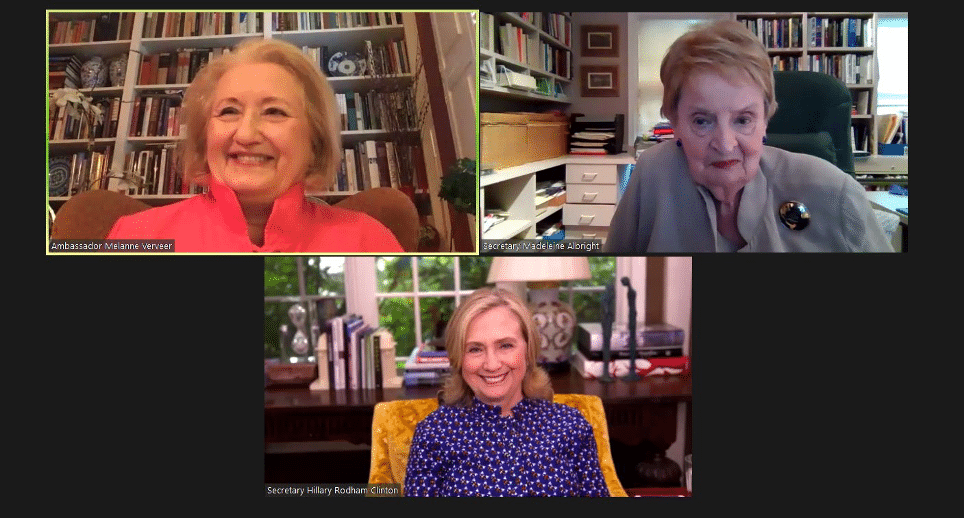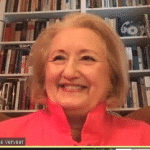Remembering Madeleine Albright
By Melanne Verveer | March 25, 2022
 Former Secretary of State Madeleine Albright (top right) reflected on her role as the United States’ first female ambassador to the UN and her legacy as a women’s rights champion during a 2020 conversation with former Secretary of State Hillary Rodham Clinton (bottom) and Ambassador Melanne Verveer hosted by the Georgetown Institute for Women, Peace and Security. Photo courtesy the GIWPS.
Former Secretary of State Madeleine Albright (top right) reflected on her role as the United States’ first female ambassador to the UN and her legacy as a women’s rights champion during a 2020 conversation with former Secretary of State Hillary Rodham Clinton (bottom) and Ambassador Melanne Verveer hosted by the Georgetown Institute for Women, Peace and Security. Photo courtesy the GIWPS.
It is with great sadness that I learned of the passing of my friend, Madeleine Albright.
I first came to know Madeleine as an esteemed colleague in the Clinton administration when she served both as the US Ambassador to the United Nations and later as Secretary of State. She became a powerful voice for the United States on international affairs and a global force for good. What is less known about her were her significant contributions to advancing progress for women and girls around the world as central to US foreign policy.
During her time as Ambassador to the United Nations, President Clinton selected her to chair the US delegation to the Fourth UN Conference on Women that took place in Beijing. She worked very closely with then-First Lady Hillary Clinton and our respective staffs to prepare for the conference, which ultimately chiseled women’s rights into international human rights law. Or, as Hillary Clinton underscored in her keynote address: “human rights are women’s rights and women’s rights are human rights once and for all.”
Several months later, President Clinton named Madeleine to be Secretary of State—the first woman to that position—and she and Hillary worked as a tag team in leading the US commitment to gender equality around the globe. When she got to the State Department, Madeleine established the first office on women’s issues. She instructed the State Department to pay closer attention to these issues, including by reporting on the condition of women in diplomatic cables, adding violations of women’s rights to the Human Rights report, creating the Vital Voices Democracy Initiative, and scheduling meetings with women in her travels as Secretary. Early in her tenure, she met with Afghan women who were refugees in Pakistan, having been forced to flee Taliban rule. She promised never to forget them, and up to the time of her death, she remained focused on the plight of women in Afghanistan.
She and Hillary forged a close bond. Madeleine invited her to join the “Frank Group” which had an exclusive membership: the two of them (and Madeleine’s chief of staff and myself). It provided a rare opportunity to come together from time to time to talk about the issues, and whatever else was on our minds. Many months after she was appointed Secretary of State, President Clinton was introducing Madeleine at an overseas embassy event and told the listeners that when he was in the process of making the decision about whom to nominate as Secretary of State, he asked Hillary what she thought—just as he solicited the opinion of others. She reminded him that Madeleine “shared his foreign policy views and was the best communicator in his administration.” She added, “besides, it would make every little girl in America proud.”
When I arrived at Georgetown, Madeleine was thrilled that the Institute for Women, Peace and Security would take the issues she had championed to another level by making the evidence-based case through research, programs, and student engagement. She was a strong supporter, participating in countless programs we sponsored. She was also one of the most popular professors on campus. So many students wanted to take her course that only a lottery would work fairly to determine who would be selected. She loved teaching, and as she and her students simulated the role of key officials in government, she always assumed the role of President of the US and contrived some of the toughest foreign policy challenges for students to address.
As a refugee, Madeleine never forgot the horrors perpetrated first by the Nazis and then the Soviets. She worked valiantly to help strengthen the new democracies and was proud to be the chair of the National Democratic Institute. To travel with her from Prague to Kosovo was to understand what she meant to those who savored their new freedom and independence and labored to build nascent democracies. In her second to last book, Fascism – A Warning, she worried about the rising authoritarianism and the democratic recession that was taking place all over the world, including troubling signs here at home. As the granddaughter of immigrants from Ukraine, I often talked to her about the situation in my ancestral homeland, and I know that despite her decline, she was closely following the devastating assault there today and the very perils about which she had warned. I already miss her voice on these issues and so many more.
Madeleine demonstrated the power of women’s leadership in shaping our world; she championed human rights and democracy; and she worked indefatigably to create a better world. I—like so many—have lost a dear friend. Georgetown has lost a cherished member of our community. And our country and world have lost a powerful force for good.
Now it’s up to us to continue her work.
Together, we make the world safer.
The Bulletin elevates expert voices above the noise. But as an independent nonprofit organization, our operations depend on the support of readers like you. Help us continue to deliver quality journalism that holds leaders accountable. Your support of our work at any level is important. In return, we promise our coverage will be understandable, influential, vigilant, solution-oriented, and fair-minded. Together we can make a difference.
Keywords: Madeleine Albright, Secretary of State, human rights, obituary, women's rights
Topics: Personal Essay














